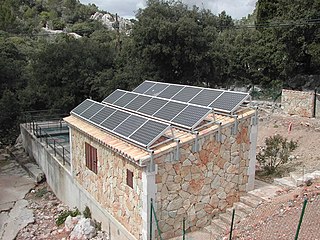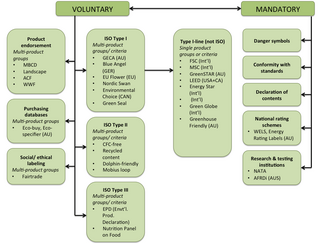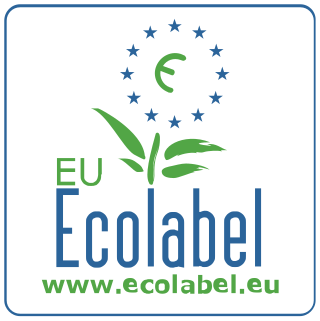
Greenwashing, also called "green sheen", is a form of advertising or marketing spin in which green PR and green marketing are deceptively used to persuade the public that an organization's products, aims and policies are environmentally friendly. Companies that intentionally take up greenwashing communication strategies often do so in order to distance themselves from their own environmental lapses or those of their suppliers.

An eco-industrial park (EIP) is an industrial park in which businesses cooperate with each other and with the local community in an attempt to reduce waste and pollution, efficiently share resources, and help achieve sustainable development, with the intention of increasing economic gains and improving environmental quality. An EIP may also be planned, designed, and built in such a way that it makes it easier for businesses to co-operate, and that results in a more financially sound, environmentally friendly project for the developer.

Environment friendly processes, or environmental-friendly processes, are sustainability and marketing terms referring to goods and services, laws, guidelines and policies that claim reduced, minimal, or no harm upon ecosystems or the environment.
The Community Chest of Hong Kong is an independent, nonprofit organization established on 8 November 1968 in Hong Kong. The Community Chest serves as an umbrella organization to provide grants to a wide range of community projects.

Ecolabels and Green Stickers are labeling systems for food and consumer products. The use of ecolabels is voluntary, whereas green stickers are mandated by law; for example, in North America major appliances and automobiles use Energy Star. They are a form of sustainability measurement directed at consumers, intended to make it easy to take environmental concerns into account when shopping. Some labels quantify pollution or energy consumption by way of index scores or units of measurement, while others assert compliance with a set of practices or minimum requirements for sustainability or reduction of harm to the environment. Many ecolabels are focused on minimising the negative ecological impacts of primary production or resource extraction in a given sector or commodity through a set of good practices that are captured in a sustainability standard. Through a verification process, usually referred to as "certification", a farm, forest, fishery, or mine can show that it complies with a standard and earn the right to sell its products as certified through the supply chain, often resulting in a consumer-facing ecolabel.
The Global Ecolabelling Network (GEN) is a non-profit network composed of some 29 ecolabel organisations throughout the world representing nearly 60 countries and territories, with two associate members and a growing number of affiliate members, one of which is Google. GEN members have certified over 252,000 products and services for environmental leadership. GEN was established in 1994.

The 2000s in Hong Kong began a new millennium under the People's Republic of China (PRC).

The Conservancy Association is a Hong Kong non-governmental organisation founded in 1968.
EcoPark located in Tuen Mun Area 38, on west side of Hong Kong, is similar to an industrial park exclusively for waste recycling and environmental engineering. This is the first of its kind in Hong Kong.

The Action Blue Sky Campaign is an environmental campaign in Hong Kong, organised by the Environmental Protection Department, to clean up the city's air pollution. It was officially launched by Chief Executive Donald Tsang on July 25, 2006. According to a press release of the Hong Kong government, its campaign slogan in Chinese is "全城投入 為藍天打氣", while its campaign slogan in English is "Clean Air for a Cool Hong Kong!" The campaign hopes to win support from the public as well as the business community, including those businesses investing in the Pearl River Delta Region.

King Yin Lei is an historic mansion in the Mid-Levels area of Hong Kong. It is within the Wan Chai District.

Ocean Conservancy is a nonprofit environmental advocacy group based in Washington, D.C., United States. The organization seeks to promote healthy and diverse ocean ecosystems, prevent marine pollution, climate change and advocates against practices that threaten oceanic and human life.

Air pollution in Hong Kong is considered a serious problem. In 2004, visibility was less than eight kilometers for 30 per cent of the year. Cases of asthma and bronchial infections have soared due to reduced air quality. However, in recent years, the hours of reduced visibility in Hong Kong have decreased by significant amounts compared to the previous ten years.

The Hong Kong Golf Club is a private golf club. It is home to the Hong Kong Open, a tournament co-sanctioned by the European and Asian Tours.

Wong Kam-sing, GBS, JP, is a Hong Kong architect and the former Secretary for the Environment, Wong had held a number of public service positions before joining the Government, including the first Chairman of the Environment and Sustainable Development Committee of the Hong Kong Institute of Architects, the Chairman of the Professional Green Building Council and the Vice Chairman of the Hong Kong Green Building Council. He has contributed to the promotion and research of the standards and guidelines for sustainable built environment applicable to the high-density urban environment of Hong Kong.

EU Ecolabel or EU Flower is a voluntary ecolabel scheme established in 1992 by the European Union.
In Hong Kong, domestic waste has always been the largest portion of municipal solid waste. In 2014, domestic waste constitutes 65% of municipal solid waste, and 43% of total solid waste at landfills. Hong Kong has the highest daily domestic waste generation rates per capita compared to other metropolitans in Asia: Metro Tokyo creates 0.77 kg per day per capita, Seoul generates 0.95 kg, Taipei City produces 1.00 kg and Hong Kong tops the rank by 1.36 kg.

Hong Kong–Namibia relations refers to the international relations between Hong Kong and Namibia.

The Hong Kong plastic shopping bag environmental levy scheme is an environmental levy scheme designed to reduce the manufacture and distribution of plastic shopping bags (PSBs) in Hong Kong. PSBs are made of materials that are not easily degradable. The extensive disposal of PSBs is putting stringent pressure on the very limited landfill capacity, thereby causing severe waste problems in Hong Kong.














